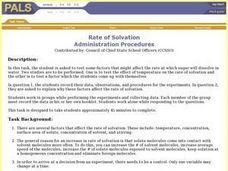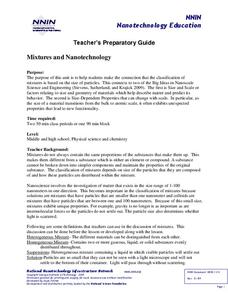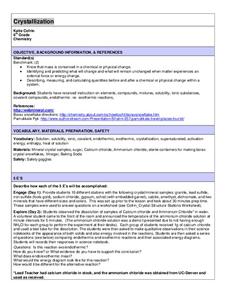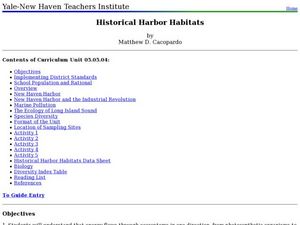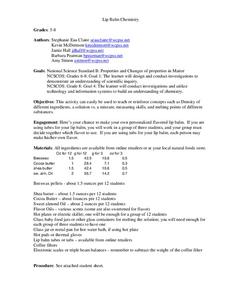Curated OER
Biosphere
There is so much to learn about the different cycles, processes, and parts of the biosphere. Using a pretest as a formative assessment to see what your budding ecologists already know is a great way to figure out which important areas...
Curated OER
Properties of Matter: "Sink or Swim"
Third graders recognize that different materials have different properties which can be observed such as texture and bouyancy, and compare and contrast, through observation, ability of some objects to float because of action of...
Curated OER
Rate of Solvation
Students test factors that may affect the rate at which sugar dissolve in water. They conduct two studies: One is to test the effect of temperature on the rate of solvation and the other is to test a factor which Students come up with...
Curated OER
Transfer of Thermal Energy
Students define temperature and heat, distinguish between temperature and heat flow, calculate amount of heat energy released or absorbed in chemical process, and design procedure, through experimentation, to gather and evaluate data to...
Curated OER
You Can Change the World
Students discuss ways they can help protect the environment. In groups, they examine various types of animals and identify their characteristics, food and habitats are compared. They create a Hyperstudio presentation in which they scan...
Cornell University
Glued into Science—Classifying Polymers
Explore the unique characteristics of polymers. A complete lesson plan begins with a presentation introducing polymers. Following the presentation, young scientists develop a laboratory plan for creating substances using polymers. They...
Serendip
Food, Energy and Body Weight
High schoolers learn why humans need calories, how they control weight with food choices, and the impact of exercise on energy. Scholars then apply their understanding to a case study of lunch choices and exercise.
National Nanotechnology Infrastructure Network
Mixtures and Nanotechnology
What does size have to do with it? Learners analyze different mixtures, both homogeneous and heterogeneous, to discover the properties related to the size of their particles. The activity connects these properties to those of...
Biology Junction
Introduction to Biology
Welcome to Biology! Introduce pupils to a subject conceptualized by Aristotle in 300 BC through a presentation and worksheet. It covers the themes of biology, characteristics of life, the scientific method, microscopes, and measurements.
Curated OER
Quarter Coin Cookies
Young scholars study the historical figures and symbols of U.S.
patriotism depicted on the penny, nickel, dime, and quarter coins. They explore the processes involved in making coins, and how metals canchange in consistency from the...
Curated OER
Water Cycle
Ninth graders explore ways water moves through various reservoirs on Earth, examine how human activities change water cycle, investigate substances present in water that indicate human activity, and discuss how understanding water cycle...
Curated OER
Balancing Equations Online
In this balancing equations worksheet, learners use an on line source to answer questions about balanced equations and they write balanced equations for various types of reactions. They balance equations using an on line game that allows...
Curated OER
The Solar System
Third graders investigate Newton's law of Motion. In this chemical reaction lesson, 3rd graders participate in an experiment with rockets to study Newton's law. Students observe the effects of a chemical reaction made by combining...
Curated OER
Autumn
Take a walk through the forest as the leaves change color and fall from the trees, making way for a new ecosystem cycle to cycle through. An inquiry-based lesson plan examines how the process of decomposition eliminates tons of biomass...
Curated OER
Crystallization
Eighth graders analyze physical change in mass. In this chemistry lesson, 8th graders describe, measure and calculate the amount of physical change occurring in mass before and after the change. Students should be familiar with elements,...
Curated OER
Historical Harbor Habitats
Tenth graders create food web displays in the classroom. In this ecology lesson, 10th graders identify the different pollutants in the environment and their effect on organisms. They collect samples of sediments from the harbor and...
Curated OER
The Sun Affects Earth
Third graders read, write, and listen to information about the sun and its effects on the Earth.as it relates to its axis, orbit, rotate, and revolution. In this solar system lesson, 3rd graders examine how the sun effects the Earth's...
Curated OER
Compost in a Bag!
Fourth graders experiment to see which objects decompose. In this compost lesson, 4th graders observe the changes of labeled objects in a bag. Leave the objects for one month and record the changes by observation and weight. Students...
Curated OER
WS 7.5 Thermodynamics Concepts and Vocabulary
In this thermodynamics worksheet, students fill in the blanks with terms related to specific heat, calorimetry, phase changes, enthalpy, entropy and free energy.
Curated OER
Lip Balm Chemistry
Students explore density, mixture and solutions in a reaction. In this chemistry lesson, students create their own chap-stick using ingredients they analyze for their chemical contents. They discuss measuring skills, melting points and...
Curated OER
Reading the River - Biological Classification
Youngsters create a list of grocery store items and then work together to categorize them as if they were setting up the shelves of the market. Then they are given a box of miscellaneous objects to practice categorizing. With these two...
Virginia Department of Education
Acids and Bases
What did one titration say to the other titration? We should meet at the end point! Young chemists perform four experiments: dilute solution, neutralization, titration, and figuring pH/pOH.
Virginia Department of Education
Molar Heat of Fusion for Water
How can you describe heat of fusion in a way the class understands and relates the importance of this concept to present day issues? In this third lesson of the series, learners conduct an experiment, demonstrating the flow of heat...
University of California
Hot! Hot! Hot!
Calories are not tiny creatures that sew your clothes tighter every night, but what are they? A science activity, presented at multiple levels, has learners experiment with heat, heat transfer, and graph the function over time. It also...




